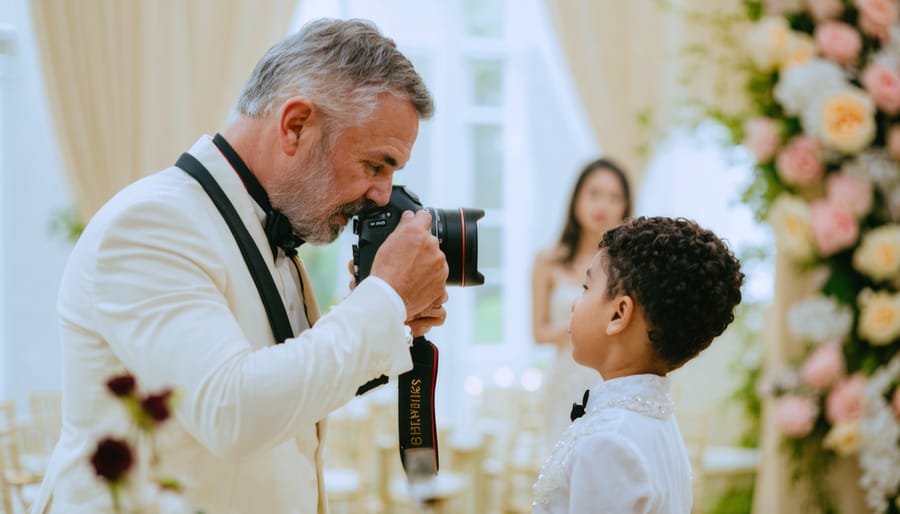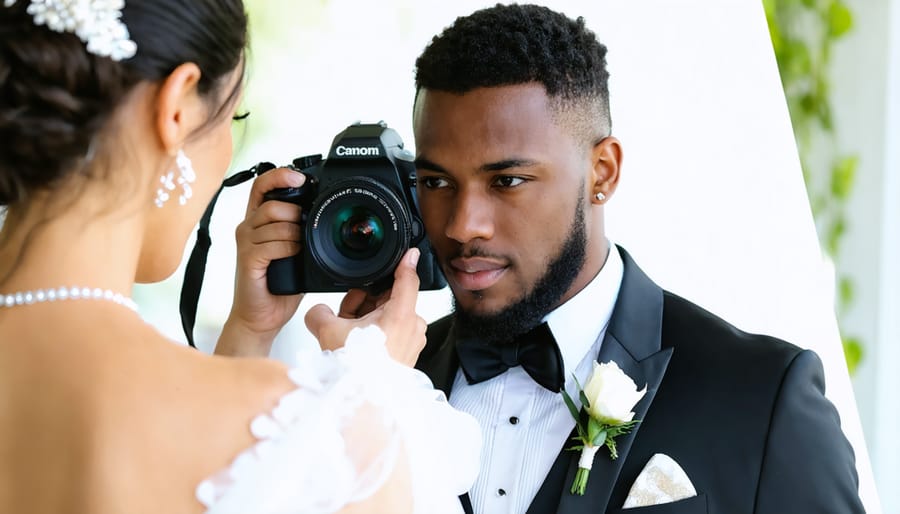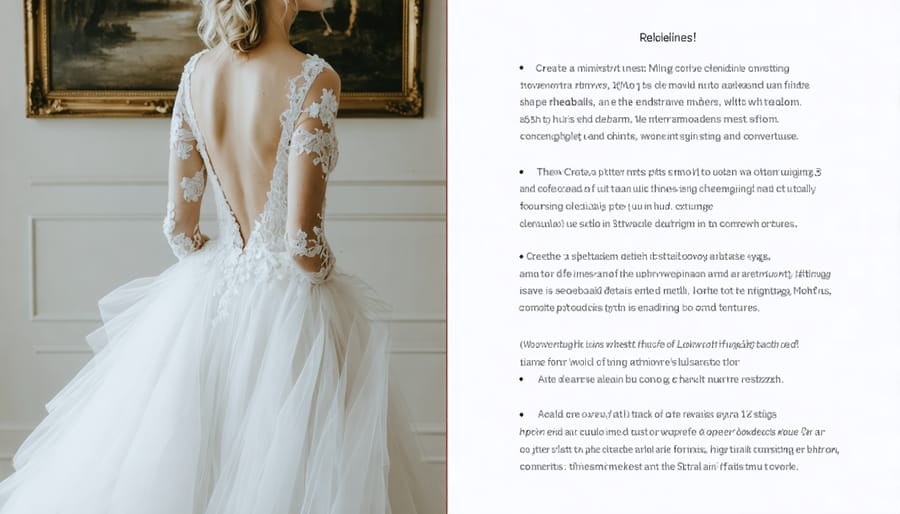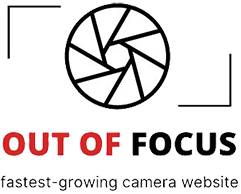
Transform your wedding photography career through strategic mentorship – a proven pathway that elevates both your artistic vision and business acumen. Mastering wedding photography demands more than technical skill; it requires insider knowledge, real-world experience, and guidance from seasoned professionals who’ve navigated the complex landscape of luxury celebrations and intimate ceremonies.
Whether you’re transitioning from portrait photography or starting fresh in the wedding industry, personalized mentorship offers the structured support, constructive feedback, and industry connections necessary to accelerate your growth. From mastering difficult lighting scenarios to pricing your services confidently, the right mentor bridges the gap between where you are and where you want to be.
Top wedding photographers consistently credit mentorship as a pivotal factor in their success, citing shortened learning curves, avoided costly mistakes, and faster business growth. Unlike generic online courses or workshops, mentorship provides tailored guidance specific to your goals, market, and artistic style. It’s an investment that pays dividends through increased bookings, higher-paying clients, and enhanced professional confidence.
As you consider taking this transformative step in your photography journey, understanding how to choose and maximize a mentorship relationship becomes crucial. The following guide explores everything from selecting the right mentor to implementing their guidance effectively, ensuring you get the most value from this career-defining investment.
Why Wedding Photography Needs Specialized Mentorship
Technical vs. Business Skills
Success in wedding photography requires mastering both technical photography skills and business acumen. While many photographers excel at capturing stunning images, they often struggle with the entrepreneurial side of the profession. A comprehensive mentorship program addresses both aspects, ensuring a well-rounded development of your career.
On the technical side, you’ll need to master lighting techniques, composition, posing, and quick decision-making in varying conditions. Wedding venues can range from dimly lit churches to bright outdoor settings, requiring adaptability and confidence with your equipment. Your mentor can help refine these skills through hands-on training and real-world scenarios.
The business aspect is equally crucial, encompassing client communication, pricing strategies, contract management, and marketing strategies for photographers. Many talented photographers struggle to maintain profitable businesses because they overlook these essential components. A good mentor will guide you through building sustainable business practices, helping you transform your technical expertise into a thriving enterprise.
The most successful wedding photographers are those who can seamlessly blend both skill sets, delivering exceptional photos while running efficient, profitable businesses. Through mentorship, you can develop this balanced approach more quickly than through trial and error alone.
Managing Client Expectations
Wedding photography is as much about managing emotions as it is about capturing moments. A mentor’s guidance proves invaluable in navigating the delicate balance between artistic vision and client satisfaction. Through real-world experience, mentors help photographers understand how to set realistic expectations from the initial consultation through final delivery.
Experienced mentors share strategies for handling common scenarios, like managing anxious couples or dealing with challenging family dynamics. They teach vital communication skills, including how to clearly articulate your creative process while remaining sensitive to clients’ concerns and preferences.
One of the most valuable aspects of mentorship is learning how to handle difficult conversations professionally. Whether it’s explaining why certain shots weren’t possible due to weather conditions or addressing timeline changes, mentors provide scripts and techniques for maintaining professionalism while preserving client relationships.
Mentors also help develop systems for managing expectations throughout the entire wedding journey. This includes creating detailed contracts, setting clear delivery timelines, and establishing boundaries – all while maintaining the warmth and enthusiasm that makes couples feel confident in their choice of photographer.
Types of Wedding Photography Mentorship Programs

One-on-One Mentoring
One-on-one mentoring represents the most personalized approach to wedding photography education, offering an intimate learning experience tailored specifically to your needs and goals. Working directly with an experienced wedding photographer allows you to receive undivided attention and customized feedback on your work, techniques, and business strategies.
During these individual sessions, you’ll typically meet with your mentor either in person or virtually for focused discussions about your portfolio, shooting techniques, and specific challenges you’re facing. Many mentors incorporate hands-on training, including shadowing opportunities at real weddings, where you can observe their workflow and decision-making process in action.
The beauty of individual mentorship lies in its flexibility. Your mentor can adjust the curriculum based on your progress, spending more time on areas where you need additional support. Whether you’re struggling with lighting techniques, client communication, or pricing strategies, your mentor can provide targeted guidance and share personal experiences that relate directly to your situation.
Most one-on-one mentoring programs include regular check-ins, portfolio reviews, and practical assignments to ensure steady progress toward your goals. This personalized attention often leads to faster improvement and more confident development as a wedding photographer.
Group Programs
Learning wedding photography in a group setting offers unique advantages that can accelerate your growth and enrich your creative journey. When you join a group program, you’re not just learning from a mentor – you’re also gaining insights from fellow photographers who bring diverse perspectives and experiences to the table.
Group sessions create a supportive environment where you can share challenges, celebrate wins, and build lasting professional relationships. Through collaborative exercises and group critiques, you’ll develop a sharper eye for composition and learn how different photographers approach the same scenarios. This peer-to-peer learning often leads to unexpected breakthroughs in your technique and creative vision.
Another significant benefit is the opportunity to participate in styled shoots and real wedding scenarios as a team. This hands-on experience helps you practice coordination, timing, and communication – essential skills for wedding day success. You’ll also learn how to handle various lighting conditions and challenging situations while having the safety net of experienced photographers nearby.
The collective energy in group programs often sparks creativity and motivation that’s harder to maintain when learning alone. Plus, the connections you make can lead to future collaborations, second shooting opportunities, and a strong professional network.

Online vs. In-Person Mentorship
Both online and in-person mentorship formats offer unique advantages for aspiring wedding photographers, and choosing between them often depends on your learning style and circumstances.
Online mentorship programs provide flexibility and convenience, allowing you to learn at your own pace from anywhere in the world. They typically include video tutorials, digital resources, and virtual one-on-one sessions. This format works particularly well for photographers who have demanding schedules or live in areas where access to experienced wedding photographers is limited. Many online programs also offer the advantage of a permanent library of resources you can revisit whenever needed.
In-person mentorship, on the other hand, delivers an immersive learning experience that’s hard to replicate virtually. Working directly alongside an experienced photographer allows you to observe their workflow in real-time, from client interactions to shooting techniques. You’ll receive immediate feedback on your technique and can ask questions as situations arise during actual wedding shoots. This hands-on approach is especially valuable for learning the nuances of lighting, positioning, and managing unexpected challenges during events.
Some photographers find the most success with a hybrid approach, combining online learning’s flexibility with occasional in-person sessions. This allows them to build a strong theoretical foundation through online resources while gaining practical experience through face-to-face mentoring sessions. Consider your learning preferences, schedule, and career goals when choosing between these options.
What to Look for in a Wedding Photography Mentor

Experience and Portfolio
When selecting a wedding photography mentor, their experience and portfolio should be your first consideration. A mentor’s work speaks volumes about their expertise, style, and professional journey. Look for photographers who have consistently documented weddings across different settings, cultures, and lighting conditions.
Start by thoroughly reviewing their portfolio, paying attention to the diversity of their work. An experienced mentor should showcase mastery in various aspects of wedding photography, from intimate detail shots to grand reception celebrations. While building a professional portfolio takes time, your potential mentor should have an established body of work spanning several years.
Consider their industry recognition, awards, and client testimonials. These indicators validate their expertise and teaching ability. Look for mentors who have worked with reputable venues and vendors, as this demonstrates their professional network and standing in the wedding industry.
Beyond technical skills, evaluate their business longevity. A successful wedding photographer who has sustained their business through different market conditions can offer invaluable insights into both the artistic and commercial aspects of the profession.
Don’t hesitate to ask potential mentors about their experience teaching others. Some excellent photographers may be skilled practitioners but might lack the ability to effectively communicate their knowledge. Request references from previous mentees to understand their teaching style and effectiveness.
Teaching Style and Communication
The success of a mentorship relationship often hinges on the compatibility between mentor and mentee. Just like every photographer has their unique shooting style, each mentor has their distinct teaching approach. Some mentors are hands-on, preferring to demonstrate techniques in real-world situations, while others excel at theoretical instruction and detailed analysis of images.
Consider your learning style when evaluating potential mentors. Do you thrive with structured lessons and detailed feedback, or do you prefer a more collaborative, discovery-based approach? A mentor who matches your learning preferences will likely yield better results and a more enjoyable experience.
Communication style is equally crucial. Some mentors maintain formal, scheduled interactions, while others offer more flexible, casual guidance. Think about whether you’d benefit from regular video calls, in-person sessions, or asynchronous feedback through email or messaging platforms. The frequency and method of communication should align with your needs and schedule.
Pay attention to how potential mentors interact during initial consultations. Are they actively listening to your goals? Do they explain concepts in a way you can easily understand? The best mentors adapt their teaching style to match their mentee’s experience level and learning pace, creating a supportive environment where questions are welcomed and mistakes are viewed as learning opportunities.
Remember, the most technically skilled photographer isn’t necessarily the best mentor for you. Look for someone who not only possesses the expertise you seek but also communicates in a way that resonates with your learning style.
Making the Most of Your Mentorship Experience
Setting Clear Goals
Setting clear goals is the foundation of any successful mentorship relationship in wedding photography. Before diving into a mentorship program, take time to reflect on what you specifically want to achieve. Are you looking to improve your technical skills with off-camera flash? Master the art of posing couples? Or perhaps you need guidance on pricing and business operations?
Write down your objectives in specific, measurable terms. Instead of a vague goal like “become a better photographer,” aim for concrete targets such as “learn to confidently shoot in low-light church venues” or “develop a workflow that cuts editing time by 50%.”
When communicating with potential mentors, be upfront about your expectations and desired outcomes. This helps them understand if they’re the right fit for your needs and allows them to tailor their guidance accordingly. Consider creating a timeline for achieving these goals – this could be mastering certain techniques within three months or booking a specific number of weddings by the end of the year.
Remember to prioritize your goals. While it’s tempting to want to learn everything at once, focusing on 2-3 key areas will lead to better results. As you progress, regularly review and adjust your objectives with your mentor. This ensures your mentorship remains aligned with your evolving needs and helps track your progress effectively.
Good goals should challenge you while remaining achievable. They serve as your roadmap throughout the mentorship journey, keeping both you and your mentor accountable and focused on your development.
Implementation and Practice
Transitioning from mentorship lessons to real-world wedding photography requires a strategic approach. Start by creating a practice timeline that mirrors typical wedding day schedules, allowing you to rehearse time-management skills in realistic scenarios. Shadow your mentor at actual weddings, taking detailed notes on their workflow and client interactions.
Create a “mock wedding” practice session with friends or models to implement techniques without the pressure of a real event. Focus on mastering one skill at a time – whether it’s directing poses, managing difficult lighting situations, or coordinating with other vendors. Record your progress in a dedicated journal, noting challenges and solutions.
Build a support network with fellow mentees to practice together and share experiences. Set up mini-sessions that focus on specific wedding moments like first looks or ring exchanges. This targeted practice helps refine your skills in manageable chunks.
Don’t forget to apply business lessons learned during mentorship. Create templates for client communications, develop pricing structures, and practice your consultation process with test clients. Use downtime to organize your equipment and create shot lists based on your mentor’s guidance.
Remember that mistakes during practice are valuable learning opportunities. Review your practice shots with your mentor, seeking specific feedback on areas for improvement. Gradually increase the complexity of your practice scenarios as your confidence grows, ensuring you’re fully prepared when it’s time to shoot your first solo wedding.
Investment and Return
Financial Considerations
Investing in wedding photography mentorship requires careful financial consideration, but when approached strategically, it can offer significant returns. Program costs typically range from $500 for basic online courses to $5,000+ for comprehensive one-on-one mentorship experiences. While these figures might seem substantial, they’re often justified by the accelerated learning curve and potential income growth.
Consider the value proposition: many successful mentees report booking 3-4 additional weddings within their first year post-mentorship, potentially generating $10,000-15,000 in extra revenue. This return often exceeds the initial investment, making mentorship a viable business decision.
However, it’s essential to evaluate your current financial position and business goals before committing. Some programs offer payment plans or tiered pricing structures, making them more accessible. When managing photography business finances, consider mentorship as a strategic investment rather than an expense.
Look for mentorship programs that provide clear deliverables and measurable outcomes. Some offer money-back guarantees or portfolio review sessions, adding value and reducing financial risk. Remember to factor in additional costs like travel expenses for in-person sessions or equipment upgrades that might be recommended during the program.

Long-term Career Impact
The long-term impact of wedding photography mentorship extends far beyond mastering camera settings and posing techniques. Many successful wedding photographers credit their accelerated growth to the guidance received through mentorship programs. By learning from experienced professionals, photographers can avoid common pitfalls that typically take years to discover independently.
Mentorship often leads to improved business acumen, helping photographers develop sustainable pricing strategies, efficient workflows, and effective marketing approaches. These skills typically translate into higher booking rates and better client relationships, creating a strong foundation for long-term success.
The network connections formed during mentorship can prove invaluable throughout one’s career. Many mentees report receiving referrals from their mentors, collaborating on projects, and building lasting professional relationships within the industry. This extended network often becomes a source of continued support, creative inspiration, and business opportunities.
Perhaps most significantly, mentorship helps photographers develop their unique style and brand identity more quickly. Rather than spending years finding their voice through trial and error, mentees can explore and refine their artistic vision under expert guidance. This clarity of direction often results in stronger portfolio development, more targeted marketing, and a more distinguished presence in the competitive wedding photography market.
The confidence gained through mentorship also empowers photographers to take calculated risks and pursue opportunities they might otherwise have hesitated to embrace.
Wedding photography mentorship is a transformative journey that can significantly accelerate your growth in this rewarding field. Through structured guidance, hands-on experience, and professional insights, you’ll develop not only your technical skills but also the business acumen necessary for long-term success. The investment in mentorship often pays dividends through increased booking rates, higher-quality deliverables, and a stronger professional network.
As you consider taking the next step in your wedding photography career, remember that finding the right mentor is crucial. Take time to research potential mentors, evaluate their teaching style, and ensure their expertise aligns with your goals. Don’t hesitate to reach out to multiple mentors, ask questions, and even request initial consultations before making your decision.
Whether you choose one-on-one mentoring, group programs, or a combination of both, the key is to remain committed to your learning journey. Start by defining your specific goals, setting a realistic timeline, and preparing yourself for dedicated practice and implementation. With the right mentorship and a proactive approach, you’ll be well-equipped to navigate the challenges and opportunities in wedding photography while building a thriving business that reflects your unique vision and style.























